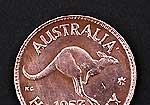More Australians dining on kangaroo
More Australians are dining on kangaroo but most are unaware that the national icon is being wild harvested rather than farmed, according to new UNSW research.
More Australians are dining on kangaroo but most are unaware that the national icon is being wild harvested rather than farmed, according to new UNSW research.

More Australians are dining on kangaroo but most are unaware that the national icon is being wild harvested rather than farmed, according to a new report. Australia has no kangaroo farms and landholders generally have no management over kangaroos on their properties, yet 65 percent of people believe that kangaroo is either fenced in on farms or free ranging in a similar way to sheep and cattle on large stations.
Based on a national consumer survey of 1600 people, the report by UNSW researchers reveals that kangaroo consumption has risen from 51 percent to 58.5 percent in the past decade. Around 15 percent of people are regular consumers of kangaroo meat, eating it four or more times per year, while more than 50 percent of people have tried it (33 percent) or are open to trying it (21 percent).
Prepared for the Rural Industries Research and Development Corporation, the report reveals higher demand for kangaroo meat than for other game, with six percent of households buying kangaroo meat at least monthly. Consumption varies considerably across the states. The percentage of medium to high consumers ranged from 21 percent in South Australia and 19 percent in Western Australia to only 9 percent in Queensland. New South Wales had the highest number of objectors (22 percent).
The report provides a snapshot of current and potential kangaroo meat consumers and identifies markets for the promising products in which kangaroo meat could be used, especially mince, deli meats and pies. "Kangaroo is the ultimate free-range food," says UNSW's Peter Ampt, one of the report's authors. "Consumers are largely unaware that kangaroos are wild harvested, but knowledge that they are isn't a barrier to its acceptance." He says kangaroo meat consumption in Australia is stymied by factors such as a perceived lack of availability, low product visibility in retail settings, and lack of confidence about how to prepare dishes easily for the table.
The report makes recommendations for improving sustainable supply of kangaroo meat/products and improving its market profile. "The industry needs to generate consistent messages that kangaroo meat is a uniquely Australian resource that is managed through careful harvesting, is humane and sustainable, and is good for the environment," says Mr Ampt.
He says there is growing support among landowners, harvesters, meat processors and regulators to work together to improve the sustainable supply of kangaroo meat/products for market, and a desire to trial different approaches to achieving consistent industry messages and branding. "An encouraging finding is that in most instances consumers who try kangaroo meat like it and would eat it again," Ampt says. "Also encouraging is that most consumers perceive kangaroo to be a healthy meat.
Peter Ampt is program manager of UNSW's Future of Australia's Threatened Ecosystems Program (FATE).
Media contacts: Peter Ampt 0421 998 886 or Bob Beale 0411 705 435